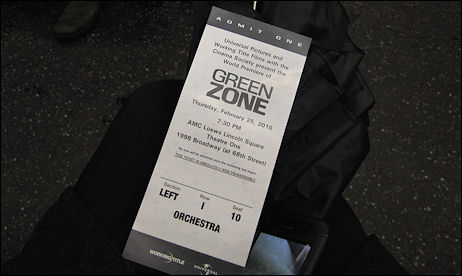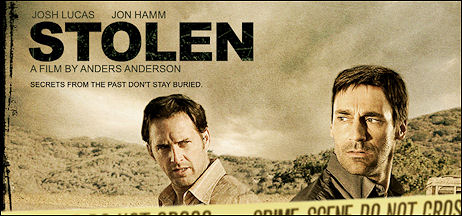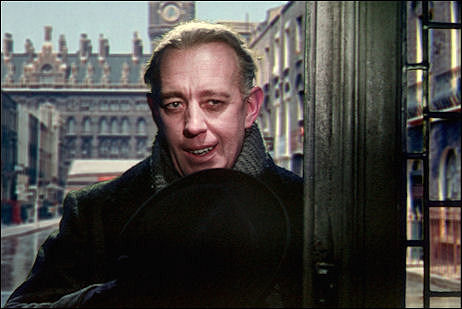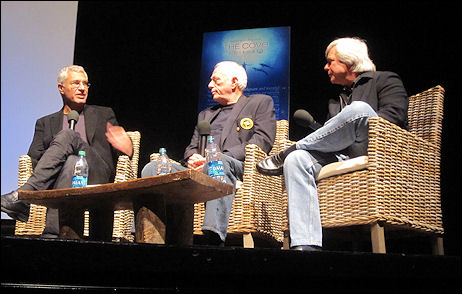
Farmer’s Market, just prior to Wolfman screening at the Grove — Thursday, 2.11, 6:20 pm.

5:10 pm


If I was Jon Hamm, I’d have it locked into my contract that for every film I do my hair has to be the exact same early ’60s Mad Men coif every time out. Okay, I’d be amenable to longish ’70s hair…fine. But I’d make it double clear that I’ll never have to wear hair that looks like a raggedy wig based on Richard Burton‘s appearance in Becket.

I have to abandon Santa Barbara for a day to take care of two or three things in Los Angeles. One of them being a Wolfman screening. I’m leaving in a half-hour or so. Santa Barbara’s pastoral serenity can get on your nerves. It’ll feel good to deal with the clutter and traffic snarls and billboard crap of West Los Angeles.

A frame capture from DVD Beaver’s review of the forthcoming Bluray of Alexander McKendrick‘s The Ladykillers. I prefer this version to the 2004 Coen brothers version with Tom Hanks because of (a) Alec Guiness‘s performance as Professor Marcus (tied with his Bridge on the River Kwai colonel as my all-time Guiness favorite) and particularly his grotesque buck teeth, and (b) the fact that the original doesn’t deal with irritable bowel syndrome.

It appears that Joe Johnston‘s The Wolfman isn’t nearly as painful or problematic as Garry Marshall’s Valentine’s Day — but they’re both drawing primarily negative Rotten Tomato ratings. The Eloi couldn’t care less, of course. Tracking indicates that both will do nicely this weekend with Valentine’s Day pulling slightly ahead.
Valentine’s Day‘s first choice open & release is 27 compared to The Wolfman‘s 24. Definite Wolfman interest is at 50/54 among younger/older males. Definite Valentine’s Day interest among younger/older women is at a staggering 67/58. Has there ever been a more relentlessly brainless moviegoing demographic than 21st Century women under the age of 25? They’ll pay to see any shameless piece of shit that pushes their buttons.
Last night the heroes of The Cove — director Louie Psihoyos and Ric O’Barry, the doc’s sad-eyed, dolphin-loving, consience-wracked star — sat for a q & a at Santa Barbara’s Lobero theatre following a showing of the film. The recent news that The Cove has finally been acquired for theatrical distribution in Japan– a major breakthrough in the campaign to put an end to dolphin killing in Taiji — lent an air of muted satisfaction.

The finale came with Psihoyos and O’Barry being handed the SBIFF’s David Attenborough Award for Excellence in Nature Filmmaking. Big grins, standing ovation, flashbulbs, etc.
Host Mike DeGruy — programmer of the festival’s Reel Nature sidebar and a cinematographer who specializes in nature filmmaking — seemed a wee bit uncomfortable with discussing the political strategies of the Cove team. He was okay with a little bit of this, but not too much. A constant grinner, DeGruy was always looking for a chuckle, urging O’Barry or Psihoyos to provide an amusing quip or personal story of some sort — the way an Entertainment Tonight anchor might handle such an interview.
No one, of course, mentioned the elephant that has been squatting in the room and knocking over furniture since The Cove opened last summer — i.e., the strong suspicion that most women have been boycotting it due to the doc’s brief third-act depiction of scores of dolphins being harpooned to death.
The financial result is that The Cove — one of the most suspenseful, best edited, and most emotionally gripping political docs of all time — never cracked a million dollars in theatrical grosses. As of early January it had made a lousy $862,313. It was released on DVD on 12.8.09. The DVD revenues will obviously spike upwards if The Cove wins the Best Feature Documentary Oscar.
After the show I asked O’Barry and Psihoyos if the response to the screenings of The Cove at last October’s Tokyo Int’l Film Festival had spurred Medallion Media to open it commercially in Japan. (It will debut there in April.) They both went “I’m not sure, I’m not privvy, ask Film Four,” etc. I don’t know why they’re shilly-shallying. The Tokyo festival showings were obviously the spark of it all.
And I don’t get why O’Barry is so fixated on Ben Stiller as the savior who finagled the Tokyo Film Festival honchos into showing The Cove. Stiller was a kind of savior — a passionate player in the effort, for sure — but the main guy was director Alejandro Gonzalez Inarritu, last fall’s TIFF jury chairman. It began when I contacted Inarritu about The Cove, urged him to see it and consider the symbolism of an allegedly green festival not showing it, etc. Stiller and Cove producer Fisher Stevens suggested the same. Inarritu saw the film, thought things over and proceeded to gently cajole and pressure festival chiefs into giving The Cove a slot.
Stiller recounted this story during a Larry King Show visit last November [above], and O’Barry was sitting right beside him as he said “well, I did what I could but it really wasn’t me as much as Inarritu,” etc. And yet O’Barry has decided that “Ben Stiller saved the dolphins” sounds better than talking about some Mexican director with a hard-to-pronounce name, etc. Simple legends are more persuasive than detailed facts.
Times Online DVD guy Michael Moran has written a fairly brutal pan of Joe Johnston‘s The Wolfman.
“As a late night DVD guilty pleasure with a bottle of wine and a playful disposition, it will probably make quite a few people very happy. As a 21st Century big screen experience, it’s something of a howler.
“The Wolfman opens, naturally, with a ‘boo’ sequence to give you the idea that you’re watching some sort of horror flick. After that you are necessarily treated to a big ugly lump of exposition that explains what Emily Blunt is doing there and why Benicio Del Toro is an English gentleman with an American accent.
“After that, you might expect a steadily escalating series of thrills leading to a gory climax. You would be mistaken. The Wolfman limps along as if it has a thorn in its paw.
“There’s some backstory about a dark secret in Benicio’s and dad Anthony Hopkins‘ family past which quite honestly blows the movie’s big reveal for all but the most inattentive viewers.
“The movie’s one genuinely chilling moment occurs in flashback, with an unsettlingly dreamlike scene of Benicio and his now-deceased brother being haunted by some freaky night-time homunculus. There’s a little Shining topiary tribute too, just for laughs.
“Then poor Hugo Weaving shows up as Inspector Francis Aberline, a police detective based (as everyone who has seen From Hell will already have spotted) on Frederick Abberline, the real-life head of the Jack the Ripper investigation.
“Until the film’s flabby midsection eventually morphs into a lycanthropically hairy climax Hugo drifts around the movie without a whole lot to do. Blunt does something similar while a pitchfork-wielding posse of disposable villagers slowly assemble themselves into a sort of one-stop werewolf buffet.
“If you’re sensitive about that kind of thing there’s some borderline racist dialogue about a nearby encampment of Gypsies to pass the time until we actually see a werewolf.
“The Gypsy encampment is presently laid waste by a mysterious beast. There’s one of those annoying moments that you get in horror flicks where a crowd of witnesses magically evaporates when they’re inconvenient. For that matter the grand old country house in which Hopkins lives is similarly deserted, with nary a servant to be seen except when two of them need to drive Blunt to safety in the middle of the night.
“Fans of weird Victorian lunatic asylum stuff will be pleased to hear that there’s some weird Victorian lunatic asylum stuff, with an hilarious action scene involving doctors who are so scared that they’ve forgotten how a door works, followed by a mad chase through a nicely realized late-Victorian London which rather unwisely invites comparison with the peerless An American Werewolf In London.
“What really cripples the move is that Del Toro is playing someone who has no character, just a bundle of characteristics. We know he went to America as a child, we know he’s back as a man. He seems not to have had any life between those events. There’s no pre-existing romantic involvement to prevent him getting together with his dead brother’s fianc√©, and the experience of being half-killed by a ravening werewolf seems to affect him not at all.
“Hopkins is similarly insouciant, reacting to an assortment of family tragedies with equanimity and even, apparently, playing a jolly harmonica when he has just visited his son in a ghastly lunatic asylum.
“Throw in some really very disappointing effects work — and don’t forget the film has been directed by a special effects master, with creature effects by revered werewolf supremo Rick Baker — and you know you’re in trouble.”
This just-posted Joy Behar Show clip of Huffington Post editor Roy Sekoff and Jackie Collins passing along an anatomical observation about John Edwards (which allegedly comes from someone who’s seen the Edwards-Hunter sex tape) is…how to describe? It’s stunning to consider how far down into the swamp Edwards has sunk. On the other hand this is the first semi-positive news about the guy since the summer of ’08. The content is icky, but it provided the first real laugh of the day. I’m sorry.
Vanity Fair‘s John Lopez has attempted to explain how the Academy preferential voting system is much more of a good thing than a bad thing. “The Academy grabbed our attention this year by expanding the best-picture nominees to an all-inclusive field of 10,” he begins. “But amid all the [talk] about whether or not this devalues Oscar, no one seemed to notice that the Academy also switched to a preferential voting system for the Best Picture category.

“That is, until Steven Zeitchik at the L.A. Times exposed the system, painting a nightmare scenario in which the most popular film doesn’t win; The New Yorker‘s Hendrik Hertzberg wondered if the new system might favor Hurt Locker; and Awards Daily mused that broad Academy love for Quentin Tarantino‘s self-proclaimed masterpiece Inglourious Basterds could let it pull an upset.
“Primed by our own love for Tarantino’s revisionist spaghetti-Holocaust drama (and inspired by Mark Lisanti‘s creative vision of how the new voting works), we at Little Gold Men figured that running a thought experiment — How could Basterds take the whole souffle? — might help us and you decipher the dark magic behind the Academy’s system. Our conclusion: the Academy might just have saved democracy.”
Referring to President Obama‘s shockwave of an interview with Bloomberg News, in which he once again caressed and winked at bankers by rhetorically kissing their asses, N.Y. Times coluimnist Paul Krugman has asked “how is it possible, at this late date, for Obama to be this clueless?
“First of all, to my knowledge, irresponsible behavior by baseball players hasn’t brought the world economy to the brink of collapse and cost millions of innocent Americans their jobs and/or houses.
“And more specifically, not only has the financial industry has been bailed out with taxpayer commitments; it continues to rely on a taxpayer backstop for its stability. The point is that these bank executives are not free agents who are earning big bucks in fair competition; they run companies that are essentially wards of the state.
“There’s good reason to feel outraged at the growing appearance that we’re running a system of lemon socialism, in which losses are public but gains are private. And at the very least, you would think that Obama would understand the importance of acknowledging public anger over what’s happening.
“But no. If the Bloomberg story is to be believed, Obama thinks his key to electoral success is to trumpet “the influence corporate leaders have had on his economic policies.” We’re doomed.